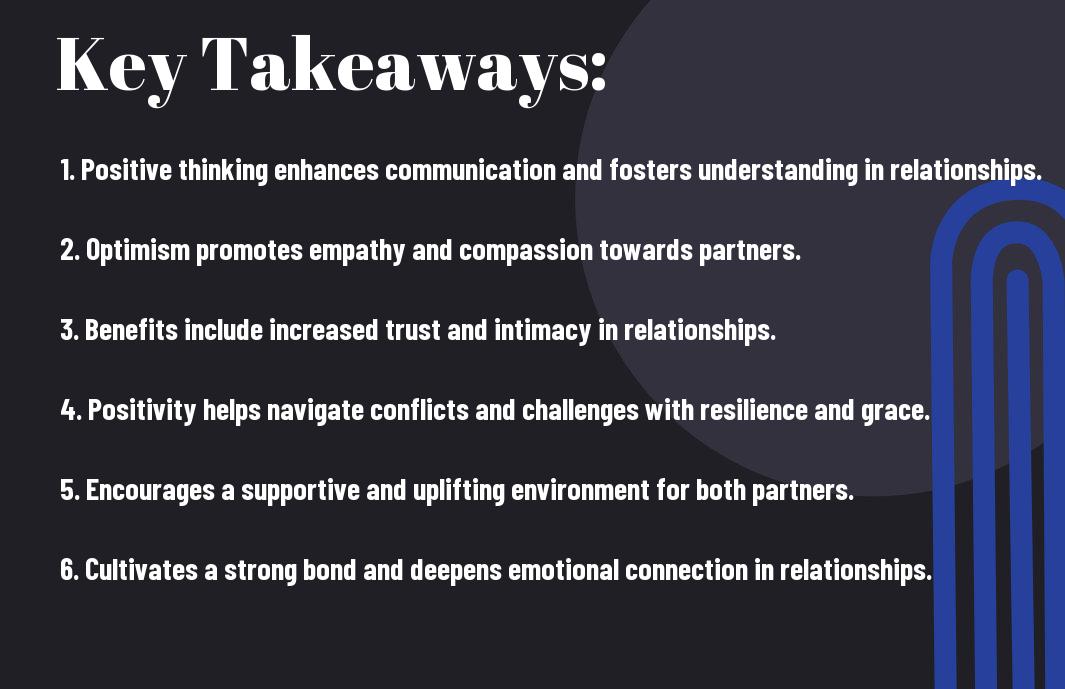Thinking positively can have a profound effect on the health and longevity of our relationships. Positive thinking can improve communication, increase trust, and foster a deeper connection with our partners. By maintaining an optimistic outlook and focusing on the good aspects of our relationships, we can reduce conflicts, enhance intimacy, and create a more fulfilling partnership. This blog post will explore the benefits of positive thinking on relationships and provide practical tips on how to incorporate this mindset into our daily interactions.
This post contains Amazon affiliate links, meaning I may earn a small commission if you purchase through my links, at no extra cost to you. Note: We aim to provide accurate product links, but some may occasionally expire or become unavailable. If this happens, please search directly on Amazon for the product or a suitable alternative.
Key Takeaways:
- Positive thinking fosters empathy: When partners maintain a positive outlook, they are more likely to understand and empathize with each other’s perspectives and feelings.
- Optimism enhances communication: Couples who approach situations with optimism tend to communicate openly and effectively, leading to healthier and more fulfilling relationships.
- Gratitude strengthens bonds: Expressing gratitude and appreciation towards your partner can deepen the emotional connection and create a stronger bond between the two of you.
- Positive mindset reduces conflicts: Couples who practice positive thinking are better equipped to handle disagreements and conflicts in a constructive manner, leading to resolution rather than escalation.
- Resilience in the face of challenges: Positive thinking equips couples with the resilience needed to face challenges together, supporting each other through tough times and coming out stronger on the other side.

The Impact Of Positive Thinking On Relationships – Strengthening Connections
One of the key aspects in understanding the impact of positive thinking on relationships lies in delving into the realm of psychology. A deeper comprehension of how our thoughts and behaviors influence our relationships can shed light on the power of positivity in fostering strong and healthy connections.
Understanding Cognitive Behavior
Behavior plays a crucial role in shaping our interactions with others. Cognitive behavior theory suggests that our thoughts impact our emotions, which in turn influence our actions. By practicing positive thinking, we can reframe negative thoughts and cultivate a mindset that promotes constructive behaviors in our relationships. This shift in perspective can lead to improved communication, greater empathy, and enhanced problem-solving abilities.
Interpersonal relationships thrive on the foundation of optimism. Research indicates that individuals who approach interpersonal interactions with a positive outlook are more likely to experience fulfilling connections with others. Optimism fosters resilience, nurtures trust, and cultivates a sense of mutual support in relationships. By embracing optimism, individuals can navigate challenges with resilience and maintain healthy relationships even in the face of adversity.
The Role of Optimism in Interpersonal Dynamics
Positive thinking not only enhances individual well-being but also elevates the quality of relationships. The practice of optimism can create a ripple effect, influencing the overall dynamics within a relationship. When both individuals maintain a positive outlook, they are better equipped to communicate effectively, navigate conflicts constructively, and foster a deep sense of connection and intimacy. By prioritizing optimism in interpersonal interactions, individuals can cultivate relationships that are resilient, supportive, and fulfilling.
Building Stronger Relationships Through Positivity
To create strong and lasting relationships, it is essential to cultivate a positive outlook and mindset. Positive thinking can play a significant role in strengthening connections and fostering a deep sense of mutual understanding and support between individuals. By incorporating positivity into our interactions, we can enhance the quality of our relationships and create a harmonious environment built on trust and respect.
Communication and Positive Thinking
Communication is the cornerstone of any successful relationship, and when combined with positive thinking, it can elevate interactions to a whole new level. When individuals maintain an optimistic mindset during conversations, they are more likely to express themselves clearly and empathetically, fostering open and honest communication. Through positive communication, partners can connect on a deeper emotional level and build a foundation of trust and intimacy.
Resolving Conflicts with a Positive Outlook
Communication is key when it comes to resolving conflicts with a positive outlook. By approaching disagreements with an optimistic attitude, individuals can focus on finding constructive solutions rather than dwelling on grievances. Positive thinking can help reduce tension during conflicts and facilitate a more collaborative approach to addressing issues within relationships. By maintaining a positive outlook, partners can navigate conflicts more effectively and come out stronger on the other side.
The ability to approach conflicts with a positive mindset is crucial for maintaining healthy relationships. When couples focus on finding solutions and are willing to compromise, they can strengthen their bond and grow together. Positive thinking can transform conflicts into opportunities for growth and understanding, ultimately deepening the connection between partners.
Cultivating a Positive Mindset
Keep in mind that a positive mindset is key to fostering healthy relationships. When you approach situations with optimism and focus on the good, you create a more harmonious atmosphere for yourself and those around you.
Strategies for Enhancing Positive Thinking
Positive thinking can be cultivated through various strategies. Start your day with affirmations to set a positive tone, practice gratitude by reflecting on what you appreciate in your life, and surround yourself with uplifting and supportive individuals. Engaging in activities that bring you joy and fulfillment can also help shift your mindset towards positivity.
One powerful technique for enhancing positive thinking is visualization. Take a few moments each day to visualize yourself achieving your goals and experiencing success. This practice can help rewire your brain to focus on the possibilities and opportunities in every situation, rather than dwelling on potential challenges.
Overcoming Negativity Bias
One common obstacle to maintaining a positive mindset is the negativity bias, a tendency to focus more on negative experiences than positive ones. To overcome this bias, challenge negative thoughts by reframing them in a more positive light. Focus on solutions rather than problems, and practice self-compassion by treating yourself with kindness and understanding.
Plus, remember that it takes time and effort to retrain your brain to default to a positive mindset. Be patient with yourself as you work to overcome negativity bias and cultivate a more optimistic outlook on life and relationships. The rewards of a positive mindset are well worth the commitment to personal growth and development.
Practical Applications in Daily Life
Positive Thinking in Romantic Relationships
For individuals looking to enhance their romantic relationships, incorporating positive thinking can make a significant difference. Positive thinking in romantic relationships involves focusing on the strengths and qualities of your partner rather than dwelling on their flaws. By adopting a positive mindset, couples can foster a deeper sense of appreciation and gratitude for each other.
Furthermore, positive thinking can help couples navigate through challenges more effectively. Instead of approaching conflicts with a negative attitude, individuals can cultivate a solution-oriented mindset that fosters compromise and understanding in the relationship.
The Ripple Effect of Positivity in Social Networks
Social networks play a crucial role in our lives, influencing our thoughts, behaviors, and overall well-being. When individuals practice positive thinking within their social networks, it can have a profound ripple effect on the people around them. Positivity is contagious, and by radiating optimism and hope, individuals can uplift the spirits of those around them.
This ripple effect can lead to a more supportive and harmonious social environment, where individuals feel empowered to spread positivity to others. Small gestures of kindness and encouragement can create a chain reaction of positive energy within the social network, strengthening connections and fostering emotional wellbeing.
Final Words
With these considerations, it is evident that positive thinking can have a significant impact on relationships by strengthening connections. By adopting a positive mindset, individuals can cultivate trust, understanding, and better communication with their partners, friends, family, and colleagues. Embracing optimism can create a more supportive and harmonious environment, leading to more fulfilling and long-lasting relationships. It is essential to remember that positive thinking is a choice that requires practice and dedication, but the rewards in the form of deeper connections and greater emotional intimacy are well worth the effort. Ultimately, maintaining a positive outlook can transform not only our relationships but also our overall well-being and quality of life.
FAQ
Q: What is the impact of positive thinking on relationships?
A: Positive thinking can strengthen relationships by fostering better communication, increasing empathy, and creating a more supportive and loving environment for both partners.
Q: How does positive thinking influence communication in relationships?
A: Positive thinking encourages open and honest communication, leading to better understanding and resolving conflicts more effectively. It also promotes active listening and showing appreciation for your partner.
Q: Can positive thinking help in resolving conflicts in relationships?
A: Yes, positive thinking can play a significant role in resolving conflicts by promoting a solution-oriented approach rather than focusing on blame. It helps partners to maintain a positive attitude and work together towards finding common ground.
Q: How does positive thinking impact emotional intimacy in relationships?
A: Positive thinking enhances emotional intimacy by creating a safe and trusting space for partners to express their feelings and vulnerabilities. It fosters a deeper connection and strengthens the bond between partners.
Q: What are the benefits of practicing positive thinking in relationships?
A: Practicing positive thinking in relationships can lead to increased happiness, improved stress management, and better overall well-being for both partners. It can also create a more resilient and harmonious relationship dynamic.









